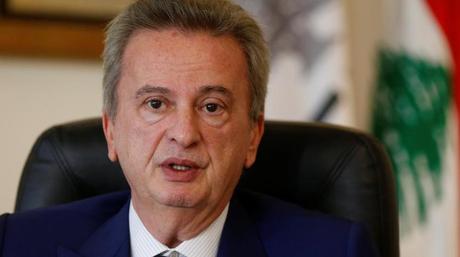Salameh Appeases Monetary Concerns amid Lebanon Crisis

The governor of Lebanon's Central Bank sought to calm nerves on Monday amid a worsening economic and financial crisis, pledging to work on safeguarding the stability of the national currency and protecting bank deposits.
Riad Salameh told reporters at a packed press conference that the bank will keep defending the currency peg, stable since 1997. He said there won't be any capital controls or a "haircut" on customer's bank deposits, in which the state takes a cut of their money to cover its debts.
As he spoke, dozens of protesters outside the bank on Beirut's commercial Hamra Street blocked the road, chanting "down with the rule of the banks!" as riot police looked on.
Already facing an economic crisis, Lebanon's financial troubles have worsened since economically driven mass protests erupted nationwide last month, paralyzing the country and keeping banks shuttered for two weeks. Depositors have rushed to withdraw their money since the banks reopened last week, with the country's lenders imposing varying capital controls that differ from bank to bank, fueling the turmoil.
Though it's still pegged at 1,500 pounds to the dollar, the Lebanese pound is trading at up to 1,900 to the dollar on the black market, a devaluation of nearly 30% from the official rate.
"The Central Bank aims to protect the stability of the pound and we have the capability to do that," Salameh said, acknowledging at the same time the difference in price in currency exchange shops, which he said was due to market demand.
He described it as a "phenomenon" that will go away when demand diminishes. Salameh added that the central bank has reserves of $38 billion — including 30 billion "that we can use immediately."
Salameh said Lebanon is a dollarized economy — and "if there are no dollars in the market, then we don't have an economy."
He said before the protests began, many Lebanese started saving cash in their homes and "according to our estimates these amounts are worth about $3 billion."
Salameh added that the central bank is allowing local lenders to borrow dollars with an interest rate of 20% to cover the needs of depositors but such money will not be allowed to be transferred electronically outside the country.
He said a mechanism has been put in place to protect deposits and keep banks afloat. He ruled out capital controls, saying the central bank does not have the legal authority to do that, but that banks should continue to do what makes sense in these "exceptional times" to manage liquidity.
Also Monday Lebanon's longtime parliament speaker Nabih Berri said there should be a new government that includes all groups in the country, including the protesters.
The main disagreement between rival groups is on whether the new Cabinet should be made up of technocrats or include politicians. President Michel Aoun has not set up a date for consultations with heads of parliamentary blocs to name a new prime minister.
Prime Minister Saad Hariri resigned on Nov. 29, meeting a key demand of anti-government protesters.
Berri also postponed a parliament session that was scheduled for Tuesday to draft new laws related to, among other things, corruption and a general amnesty over security concerns. The next session is now scheduled for Nov. 19.
There have been calls by anti-government protesters for a general strike and for closing roads leading to parliament.
-
11 November 2019, 13:26
Salameh: In light of these exceptional circumstances in Lebanon, the capability we would like to show is to preserve stability until the country restores normalcy.
-
11 November 2019, 13:09
Salameh: Banks provide funding for the country but we are not the side responsible for spending.
-
11 November 2019, 13:07
Salameh: BDL has no intention, not now nor in the future, of implementing a capital control policy.
-
11 November 2019, 13:00
Salameh: Sayings that local banks have their funds all kept at BDL are baseless. Banks have investments abroad and in private and public sectors.
-
11 November 2019, 12:57
Salameh: BDL can not control money notes at exchange houses.
-
11 November 2019, 12:55
Salameh: We have asked local banks to study all the facilities gven to customers and look into all returned cheques.
-
11 November 2019, 12:51
Salameh: We have taken the necessary measures to protect the customers' deposits. Reports claiming the bank will cut of these deposits are baseless.
-
11 November 2019, 12:50
Salameh: We will continue to preserve the stability of the Lebanese pound versus dollar. We have the capabilities for that.
-
11 November 2019, 12:45
Salameh: Listing some institutions on the OFAC list have affected the banks, withdrawals spiked after that.
-
11 November 2019, 12:42
Salameh: Lebanon's economy is much based on dollar. Absence of dollar affects the economy.
-
11 November 2019, 12:40
Salameh: An economic decline and zero development affected the people's living conditions.
-
11 November 2019, 12:37
Salameh: Interest rates saw a rise by 3% when Hariri submitted his resignation last year.
-
11 November 2019, 12:35
Central Bank Governor Riad Salameh: Lebanon has witnessed successive crises including the delayed formation of the government.



